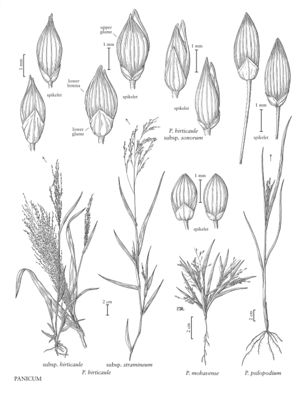familyPoaceae
subfamilyPoaceae subfam. Panicoideae
genusPanicum
subgenusPanicum subg. Panicum
sectionPanicum sect. Panicum
speciesPanicum hirticaule
subspeciesPanicum hirticaule subsp. hirticaule
Difference between revisions of "Panicum hirticaule subsp. hirticaule"
Treatment appears in FNA Volume 25. Treatment on page 462.
imported>Volume Importer |
imported>Volume Importer |
||
| Line 36: | Line 36: | ||
|publication year= | |publication year= | ||
|special status= | |special status= | ||
| − | |source xml=https:// | + | |source xml=https://bitbucket.org/aafc-mbb/fna-data-curation/src/2e0870ddd59836b60bcf96646a41e87ea5a5943a/coarse_grained_fna_xml/V25/V25_1240.xml |
|subfamily=Poaceae subfam. Panicoideae | |subfamily=Poaceae subfam. Panicoideae | ||
|tribe=Poaceae tribe Paniceae | |tribe=Poaceae tribe Paniceae | ||
Revision as of 21:01, 5 November 2020
Culms 11-70 cm tall, usually simple; nodes usually hirsute. Sheaths hirsute, hairs papillose-based; Blades 3-16 mm wide, rounded basally. Panicles erect. Spikelets 1.9-3.3 mm. Lower paleas less than 1/2 as long as the upper florets. 2n = 18, 36.
Discussion
Panicum hirticaule subsp. hirticaule is the most commom of the subspecies, growing throughout the range of the species but occurring more often in arid habitats. It includes P. alatum Zuloaga and Morrone, a recently described species that differs from P. hirticaule subsp. hirticaule by the presence of paired elaiosomes at the base of a slightly stipitate upper floret.
Selected References
None.
Lower Taxa
None.
... more about "Panicum hirticaule subsp. hirticaule"
